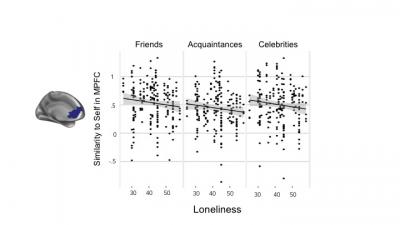New insight into how the brain maps our interpersonal ties

Credit: Figure provided by Andrea L. Courtney and Meghan L. Meyer
Social connection with others is critical to a person’s mental and physical well-being. How the brain maps relationships with other people in relation to one’s self has long been a mystery. A Dartmouth study finds that the closer you feel to people emotionally, the more similarly you represent them in your brain. In contrast, people who feel social disconnection appear to have a lonelier, neural self-representation. The findings are published in the Journal of Neuroscience.
“If we had a stamp of neural activity that reflected your self-representation and one that reflected that of people whom you are close to, for most of us, our stamps of neural activity would look pretty similar. Yet, for lonelier people, the neural activity was really differentiated from that of other people,” explained senior author Meghan L. Meyer, an assistant professor of psychological and brain sciences, and director of the Dartmouth Social Neuroscience Lab.
The study was comprised of 50 college students and community members ranging from age 18 to 47. Before going in an fMRI scanner, participants were asked to name and rank five people whom they are closest to and five acquaintances. During the scan, participants were asked to make trait judgements about themselves, the people they are closest to and the acquaintances that they had just named, and five celebrities. Participants were asked to rate how much a trait described a person (such as if the person is friendly) on a scale from 1 to 4 (from not at all to very much).
The results showed how the brain seemed to cluster representations of people into three different cliques: 1) oneself, 2) one’s own social network, and 3) well-known people, like celebrities. The closer participants felt to someone, the more similarly their brain represented them throughout the social brain, including in the medial prefrontal cortex (MPFC), the region associated with the concept of self. Lonelier people showed less neural similarity between themselves and others in the MPFC, and the demarcations between the three cliques was blurrier in their neural activity. In other words, the lonelier people are, the less similar their brain looks when they think about themselves and others.
Meyer added, “It’s almost as if you have a specific constellation of neural activity that is activated when you think about yourself. And when you think about your friends, much of the same constellation is recruited. If you are lonely though, you activate a fairly, different constellation when you think about others than when you think about yourself. It’s as though your brain’s representation of yourself is more disconnected from other people, which is consistent with how lonely people say they feel.”
The findings illustrate how loneliness seems to be associated with distortions in the neural mapping of social connections with others.
###
Meyer is available for comment at: [email protected]. The study was co-authored by Andrea L. Courtney, a post-doctoral research fellow in psychology at Stanford University, who was a graduate student in psychological and brain sciences at Dartmouth at the time of the study.
Media Contact
Amy D. Olson
[email protected]
Related Journal Article
http://dx.




